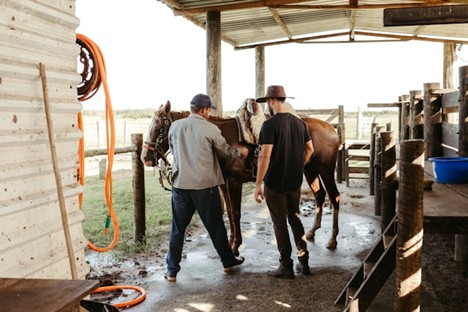
Adolescence is a transformative stage in life, full of emotional, physical, and psychological growth. However, for some teenagers, this period is clouded by trauma, emotional distress, or difficult life circumstances. Whether stemming from family issues, bullying, substance abuse, mental health challenges, or trauma, these struggles can severely impact their well-being and hinder their development.
Fortunately, residential programs offer a crucial support system for teenagers in crisis. These programs provide a safe, structured environment where adolescents can address their challenges, develop healthier coping mechanisms, and ultimately rebuild their lives. By offering a variety of therapeutic interventions, residential programs support teenagers in overcoming difficulties, learning new skills, and regaining a sense of hope for their futures. One particularly effective approach found in some programs is equine-assisted therapy schools, where teens engage in activities with horses to develop emotional regulation, build trust, and foster self-awareness.
The following article discusses how residential programs work to provide safe spaces for teens in to promote healing and personal growth.
For a teenager in crisis, one of the most essential factors in their recovery is creating a safe, stable, and structured environment. When adolescents experience trauma, substance abuse, or behavioral problems, they often find themselves in environments that feel chaotic, unsafe, or unpredictable. Whether at home, school, or with peers, these negative surroundings can exacerbate their distress and make it difficult for them to manage their emotions or behavior.
Residential programs address this by offering a stable living environment where the daily routine is structured, predictable, and designed with the teenager's well-being in mind. From regular therapy sessions to recreational activities, every aspect of these programs is carefully planned to provide both structure and support. This stability allows teens to focus on healing and growth without the distractions or stressors that may have previously interfered with their well-being.
Residential programs often incorporate multiple therapeutic interventions designed to meet the unique needs of each adolescent. These therapies aim to address the root causes of the teenager’s struggles and help them build emotional resilience, improve social skills, and gain a better understanding of themselves and others. Here are some common therapeutic interventions used in residential programs:
Working with horses helps teenagers manage their emotions and behavior. This form of therapy involves grooming, riding and caring for horses in a controlled, supportive setting, where teens learn to build trust, improve communication skills, and practice emotional regulation.
The nature of these animals - non-judgmental, responsive, and intuitive - makes them excellent companions in therapy. Horses mirror the emotional states of the people they interact with, providing immediate feedback to the handler. For example, if a teen is anxious or angry, the horse’s behavior will reflect this, teaching the teen to be aware of their emotional states and how to regulate them.
This form of therapy has been shown to help teens who struggle with issues such as anger, anxiety, depression, trauma, and interpersonal difficulties. By connecting with the horses, adolescents can gain insights into their emotions, learn healthy coping mechanisms, and experience a sense of accomplishment and self-worth.
Group therapy is another cornerstone of many residential programs, as it provides teens with the opportunity to connect with peers who are facing similar challenges. In group therapy, individuals are guided by a trained therapist, where they can openly discuss their feelings, experiences, and struggles in a safe, non-judgmental setting.
Group therapy can be incredibly beneficial for teenagers because it allows them to share their experiences, feel understood, and learn from others. It fosters empathy, helps break down feelings of isolation, and reinforces the idea that they are not alone in their struggles. Group therapy can offer a powerful sense of belonging and connection.
Adolescents learn how to navigate social interactions, express themselves clearly, and resolve conflicts in healthy ways - skills that are essential for their long-term success and well-being.
One-on-one sessions with a licensed therapist allow teens to explore their unique experiences in a private, confidential setting. These sessions can be particularly helpful for addressing deeper emotional issues, such as trauma, grief, anxiety, depression, or self-esteem struggles.
Therapists use a variety of techniques, including cognitive-behavioral therapy (CBT), dialectical behavior therapy (DBT), trauma-focused therapy, and mindfulness practices, depending on the needs of the individual. These therapies help teens identify negative thought patterns, understand their emotions, and develop healthier coping strategies.
Individual therapy can also help teens process the underlying causes of their struggles, whether that’s past trauma, difficult family dynamics, or struggles with identity. Working through these issues in a supportive, non-judgmental environment can be incredibly healing and empowering.
Many residential programs incorporate family counseling into their treatment plans, as the involvement of the family is crucial for lasting success. Family therapy aims to improve communication, rebuild trust, and address any dysfunction or unhealthy dynamics that may be contributing to the teenager’s struggles.
Family counseling allows the teen to express their feelings and experiences in front of their loved ones in a safe space. It also provides an opportunity for parents or guardians to better understand their child’s needs and learn how they can offer better support. In cases where the family dynamic has been particularly challenging, family therapy can be the first step in rebuilding relationships and establishing a healthier, more supportive home environment.
By involving the family in the healing process, residential programs help ensure that the changes made during the program are reinforced and maintained after the teen returns home. This holistic approach maximizes the chances of long-term success and stability.

Residential programs offer a wide range of benefits for teens who are experiencing emotional, behavioral, or psychological challenges. These programs provide a safe space for teens to process their struggles, rebuild their self-esteem, and develop the skills necessary to manage their emotions and relationships.
Consistency and Stability: Residential programs provide a structured routine that offers stability in the midst of chaos. This consistency helps teens feel safe and supported, giving them a foundation on which they can begin to heal and grow.
Holistic Healing: By incorporating various therapeutic approaches, including individual and group therapy, family counseling, and experiential therapies, these programs provide a well-rounded approach to healing that addresses both the emotional and psychological needs of adolescents.
Skill Development: In addition, residential programs teach essential life skills, including conflict resolution, communication, time management, and self-care. These skills empower teens to make healthier choices and build a brighter future.
Social Connection and Peer Support: Adolescents who have experienced trauma or mental health struggles often feel isolated. Residential programs provide an opportunity for teens to connect with others who are facing similar challenges, which fosters empathy, understanding, and personal growth.
Preparation for Reintegration: Residential programs do not just focus on short-term healing - they also prepare teens for reintegration into their communities. The skills and tools learned in these programs can help adolescents transition back to school, home, and other environments with confidence and resilience.
Residential programs for adolescents in crisis provide a transformative experience for teens who have experienced trauma, mental health issues, or behavioral struggles. By offering a safe, structured environment and incorporating various therapeutic approaches, these programs help adolescents rebuild their lives and develop the skills necessary to succeed.
Through these programs, adolescents gain not only the tools to address their immediate challenges but also the emotional resilience and coping strategies to navigate future obstacles. By providing a supportive and nurturing space, residential programs empower teens to embrace healing, self-discovery, and personal growth, giving them the foundation to lead healthier, more fulfilling lives.